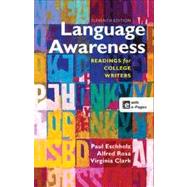
e-Pages (online only) are labeled in the contents below. Students receive automatic access to e-Pages with the purchase of a new book. If the code in a book or card is expired, they can purchase access here.
1. Reading Critically
Getting the Most out of Your Reading
Natalie Goldberg, Be Specific
Henry Louis Gates Jr., What’s in a Name?
Reading as a Writer
2. Writing in College and Beyond
Developing an Effective Writing Process
*Student paper–Rebekah Sandlin, The "Negro Revolt" in Me
3. Writing with Sources
*What Does It Mean to Write with Sources?
*Write with Sources
*Learn to Summarize, Paraphrase, and Quote from Your Sources
Avoid Plagiarism
*Student paper–Jake Jamieson, The English-Only Movement: Can America Proscribe Language with a Clear Conscience?
4. Understanding the Power of Language
Malcolm X, Coming to an Awareness of Language
Helen Keller, The Day Language Came into My Life
David Raymond, On Being 17, Bright, and Unable to Read
*Mary Pipher, Writing to Change the World
*Martin Luther King Jr., Letter from Birmingham Jail
*e-Page Manisha Samal, Culture and Language Learning in Real Time (photo essay)
5. Language Essentials
Susanne K. Langer, Language and Thought
Stephen Pinker, Words Don’t Mean What They Mean
*Ben Zimmer, Chunking
*Erin McKean, "Neologizing 101
*Michael Erard, An Uh, Er, Um, Essay
*Lera Boroditsky, Lost in Translation
*e-Page Eric Sonstroem, Play and Language (audio piece)
6. Language Communities
Paul Roberts, Speech Communities
*Richard Lederer, What Did You Say?
*James Baldwin, If Black English Isn’t a Language, Then Tell Me, What Is It?
*Bharati Mukherjee, Two Ways to Belong in America
*Amy Tan, Mother Tongue
*e-Page Amy Walker, 21 Accents (video)
7. Writers on Writing
*Stephen King, Reading to Write
Linda Flower, Writing for an Audience
Anne Lamott, Shitty First Drafts
Donald M. Murray, The Maker’s Eye: Revising Your Own Manuscripts
William Zinsser, Simplicity
*e-Page Stephen King, On Writing (video)
8. Language that Manipulates: Politics, Propaganda, and Doublespeak
Donna Woolfolk Cross, Propaganda: How Not to Be Bamboozled
Newman P. Birk and Genevieve B. Birk, Selection, Slanting, and Charged Language
George Orwell, Politics and the English Language
William Lutz, The World of Doublespeak
*Jason Stanley, The Ways of Silencing
*e-Page Ben Jervey, Tracking the Language of the Environment
9. Language that Made a Difference
*Wangari Maathai, Planting the Seeds of Peace: 2004 Nobel Prize for Peace
*Martin Luther King Jr., I Have a Dream
*John F. Kennedy, Inaugural Address
*Abraham Lincoln, Second Inaugural
Sojourner Truth, And Ain’t I a Woman
Jonathan Swift, A Modest Proposal
*e-Page Abraham Lincoln, (as read by Johnny Cash), The Gettysburg Address
10. The Language of Prejudice, Discrimination, and Stereotypes
Andrew Sullivan, What’s So Bad about Hate?
Gordon Allport, The Language of Prejudice
Gloria Naylor, The Meanings of a Word
Grace Hsiang, "FOBs" vs. "Twinkies": The New Discrimination is Interracial
Brent Staples, Black Men and Public Places
*Firoozeh Dumas, The "F Word"
*e-Page Victor Villanueva and Nick Burns, Language and Racism (ingerview)
11. Language and Technology
*David Crystal, Texting–Why All the Fuss?
*Alison Stein Wellner, Lost in Translation
*Joseph P. Kahn, What Does "Friend" Mean Now?
*David Carr, Keep Your Thumbs Still When I’m Talking to You (NYT, 4/17/2011)
*Anand Giridharadas, America and the "Fun" Generation
*e-Page Visual Thesaurus (Web site)
12. Language and Advertising
Bill Bryson, The Hard Sell: Advertising in America
William Lutz, Weasel Words: The Art of Saying Nothing at All
*Frank Luntz, Be All That You Can Be: The Company Persona and Language Alignment
*Kim Severson, Be It Ever So Homespun, There’s Nothing Like Spin
Sarah Federman, What’s Natural about Our Natural Products?
*e-Page Wall Street Journal, "Halftime in America" Backlash (Web text)
13. Language and Gender
Deborah Tannen, You’re Wearing That? Exploring the Delicate and Explosive Mother-Daughter Relationship
Clive Thompson, He and She: What’s the Real Difference?
John H. McWhorter, Missing the Nose on Our Face: Pronouns and the Feminist Revolution
*Michael Kimmel, "Bros Before Hos": The Guy Code
Martha Irvine, "Queer" Evolution: Word Goes Mainstream
*e-Page Paul Muhlhauser and Kelly Bradbury, How Genders Work: Producing the J.CREW Catalog (Web text)
14. Arguing about Language
Should English Be the Law?
Robert D. King, Should English Be the Law?
Charles Krauthammer, In Plain English: Let’s Make It Official
Myriam Marquez, Why and When We Speak Spanish in Public
Should Language Be Censored?
Roger Rosenblatt, We Are Free to Be You, Me, Stupid, and Dead
Irving Kristol, Pornography, Obscenity, and the Case for Censorship
*Pat Conroy, Letter to the Editor of the Charleston Gazette
*Richard Perez-Pena, Stutterer Speaks Up in Class; His Professor Says Keep Quiet
How Do Words Hurt?
*Christopher M. Fairman, The Case Against Banning the Word Retard
*Timothy Shriver, The Bigotry Behind the Word Retard
*John C. McGinley, Spread the Word to End the Word
*Vicki Santillano, The Great "R-word" Debate: Is It Ever Okay to Say?
15. A Brief Guide to Writing a Research Paper
*New to this edition
The New copy of this book will include any supplemental materials advertised. Please check the title of the book to determine if it should include any access cards, study guides, lab manuals, CDs, etc.
The Used, Rental and eBook copies of this book are not guaranteed to include any supplemental materials. Typically, only the book itself is included. This is true even if the title states it includes any access cards, study guides, lab manuals, CDs, etc.